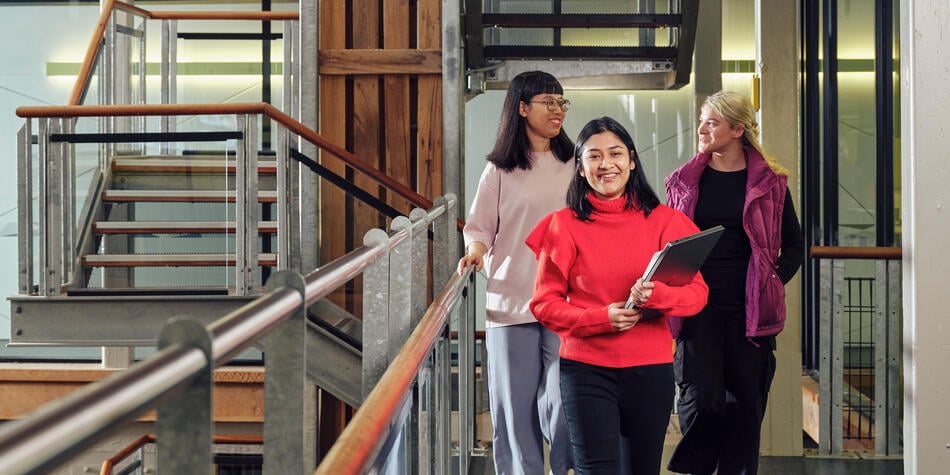There’s no denying that the world of work is changing – and today’s career options barely resemble those of a few decades ago. If you’re considering undergraduate study, you realise the importance of a degree in these changing times. But you may be trying to figure out what kinds of education and skills will ‘futureproof’ you.
Technology is at the forefront of a lot of the change. The way we live, work and learn is being fundamentally altered by artificial intelligence (AI) and machine learning. We have algorithms to provide product recommendations, machines to perform everyday tasks, and software applications to engineer efficient solutions all on their own.
While some jobs are threatened by redundancy, rapid growth is expected in several sectors. To compete in the future job market, it’s essential to develop transferrable skills to ensure you can navigate an uncertain employment landscape.
According to Professor Liz Johnson, Deputy Vice-Chancellor (Education) at Deakin University, there’s no need to despair as AI, robotics, nanotechnology and other socio-economic factors replace the need for human workers. Being employable is about ‘understanding how careers work, and how you’re going to present yourself to a future employer,’ she says.
What are soft skills in the workplace?
Since it’s been estimated that 85% of the jobs that will exist in 2030 haven’t been invented yet, today’s employers increasingly value ‘soft’ skills such as creativity and leadership.
But according to Prof. Johnson, these skills are anything but ‘soft’. She prefers to call them ‘enterprise’ or ‘transferable’ skills because they are transferable between occupations and guarantee you’re able to learn on the job.
Some of the most important transferable skills that you’ll need for future jobs include:
- communication
- digital literacy
- critical thinking
- problem solving
- self-management
- teamwork
- global citizenship.
For most future students looking into their university options, ‘the first thing they choose is the subject area,’ Prof. Johnson explains. ‘They’ll say, “hmm, occupational therapy – interesting. Law – not interesting.’
However, that is just the first piece of the puzzle to be solved by your educational choice. According to research, in today’s world, when you work or train in one job, you acquire the skills needed for 13 different jobs. The key is getting your foot in the door – and that’s where transferable skills come in.
How will Deakin help you build transferable skills?
‘What we’re trying to do is get students to think about themselves not just as a subject area expert, but as a professional,’ Prof. Johnson explains.
People run their careers differently in the new-millennium workplace, and the expectation of staying in the same workplace for decades now seems quaint. So, your university degree needs to set you up to be able to cope with the ongoing changes in the job market.
‘At Deakin, we’ve got a set of eight graduate learning outcomes. The first one is those discipline-specific knowledge and skills, and the rest of them are all about enterprise skills,’ Prof. Johnson explains. Throughout Deakin’s degrees, assessment tasks are mapped to transferable skills to ensure students are learning more than just facts and figures.
‘The way that you might evidence teamwork in a nursing degree might be quite different to the way you might do it in environmental management, for example,’ Prof. Johnson adds. ‘But it has to be there, and the university insists that it’s there in the assessment so we know that students actually have to demonstrate what they’ve achieved in those areas.’
How will you maintain a point of difference in the future of work?
You’ve probably heard it said before: job security is a thing of the past. As downsizing, outsourcing and freelancing all become familiar terms, how can you differentiate yourself in a sea of job seekers?
When you study at Deakin, you’ll also have access to our award-winning career service, DeakinTALENT, to help you stand out for future jobs. Offering services from career coaching and resume reviews to internship and job placements, the dedicated DeakinTALENT team gives students help and support at every stage of their career journey.
‘We’re embedding career education, that is, developing those key employability skills, inside courses as well,’ Prof. Johnson adds. ‘So, it’s not just students doing it in their spare time, it’s actually part of their courses.’
Speaking of courses, many of Deakin’s courses have direct input from industry experts, and students work on real-world projects often with real clients, so you’ll be sure to graduate ready for the workplace.
Choosing an undergraduate degree is an exciting prospect. Embrace the exciting changes set to come and opt for a university that emphasises combining both transferable skills and technical skills to futureproof your career and prepare for the new work order.

